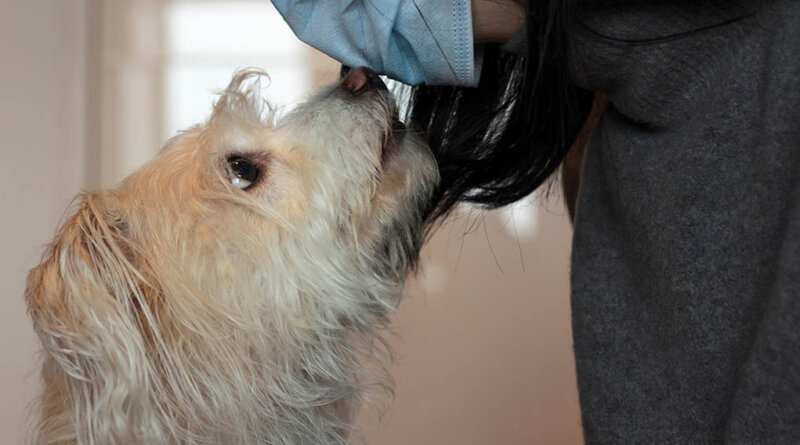Dogs Can Detect Covid-19 Virus – Top Dog Tips
[ad_1]
Dogs may be the future of COVID testing as the new research shows that dogs can detect Covid with a high accuracy rate of 97%.
But how is that possible for canines?
In this article, we’ll talk about:
- How dogs detect the COVID-19 virus
- What are the advantages of using canine testers
- And how can dog’s ability help us in containing the COVID-19
If you’re curious about what power enables canines to sense something invisible to human eyes, join us as we uncover this mystery.
How Can Dogs Detect COVID-19 Virus?
Dogs have more than 300 million scent receptors, whereas humans have only 5,000,000, and their sense of smell is around 1,000 to 10,000 times better than ours.
No wonder why they’re everywhere, doing all kinds of work from sniffing diabetes, some types of cancer, and other diseases.
They can also help search and rescuers teams during natural disasters, aid militaries in their operations, and detect hidden explosives.
When the pandemic swept the entire globe in early 2020, millions of people became infected with the SARS-COV2.
Tools like polymerase chain reaction (PCR) tests became in demand, but many countries could not afford mass testing, and the number of COVID-19 cases has grown at such a tremendous rate.
But during a challenging time, an idea was born.
The University of Pennsylvania School of Veterinary Medicine Working Dog Center researchers leveraged the dog’s disease-detecting abilities to help detect the virus.
So, in November 2020, they started training disease-detector dogs to help them recognize and pick up scents from volatile organic compounds from a person’s body fluid like sweat.
And the results are impressive!
But, they’re not the only researchers who studied and trained dogs to detect the virus that causes COVID-19.

Different Researches About Virus-Detection Dogs Across the World
Many countries worldwide are doing extensive research on whether dogs can detect SARS-COV-2, the virus that COVID-19 infection.
United States of America
Some organizations conducted a study regarding virus-sniffing dogs, and they used different methods in helping dogs detect the virus.

#1: Detecting SARS-COV on Sweaty Shirts
One of the pioneers of training dogs in detecting COVID-19 is the researchers at the University of Pennsylvania’s School of Veterinary Medicine.
Based on their study published in PLOS ONE journal in April, the virus has a distinct scent that trained dogs could identify in urine and saliva.
So, with the help of dogs named Tuuka, Griz, Toby, Rico, and Roxie, they examined whether canines can smell the scent of SARS-COV-2 in sweaty shirts.
Penn researchers started training the dogs to sniff out SARS-COV-2 from urine and saliva samples last spring 2020 and train dogs with sweat in November.
The research was done by placing sweaty T-shirts and distractors like clean cloths, shipping materials, and rubbing alcohol on the ends of an 8-spoke metal wheel.
They placed each one inside a mesh-covered canister, and only one canister contains the shirt used by a person infected by COVID-19 for 48 hours.
The dogs should be able to detect the positive sample while walking around the wheel.
Regarding their urine and saliva samples, the canines could find the virus with 96% accuracy.
While the study with T-shirts is still ongoing, canines are doing a great job determining the positive sample.
The fastest dog to find the positive sample while walking on the wheel was Roxie, who did it in just 12 seconds, while Rico, the more contemplative canine, took around 23 seconds to identify the correct shirt.

#2: Detecting SARS-COV on Visitor’s Shoes
The Doctors Hospital of Sarasota in Florida, spearheaded by Robert Meade, also started an April experiment involving a Labrador retriever named Buffy.
She had to sniff visitor’s shoes, and if she identifies a COV-19-infected person, she’d sit at their feet and wait for a treat.
And that visitor should take a nasal swab test before entering. Ten days later, Buffy had identified one case.
 France
France
A study in France conducted by France’s national veterinary school in collaboration with Necker-Cochin hospital’s clinical research unit in Paris also showed that dogs could detect the presence of a virus.
The researchers collected samples from 635 participants aged 6 to 76 who volunteered to undergo the PCR test at testing centers in Paris.
They used the cotton pads pressed under the participants’ armpits for two minutes from the PCR tests for the trials and sealed them in jars.
They’ve given the samples to at least 2 of 9 dogs involved in the trial.
The dogs did not contact the volunteers, and the dogs’ handlers have no idea which samples are positive.
But as mentioned earlier in this article, it has an impressive accuracy rate of 97%.
Additionally, dogs were able to identify negative samples with 91% accuracy in their trial.
And according to a recent review of 64 studies regarding LFT (Lateral Flow Test), this test type can correctly identify 72% of the COVID-infected people with symptoms and 58% of those who are not.
These studies show that dogs are better than lateral flow tests in detecting COVID in humans.
Professor Dominique Grandjean from the National Veterinary School of Alfort in France also stated that studies have shown that dogs are trainable for COVID detection with 82% to 99% sensitivity and 84% to 98% specificity.
The test’s sensitivity refers to the dog’s ability to accurately detect COVID infection, while specificity indicates how well it can avoid giving false positives.

Germany
In Germany, researchers from the University of Veterinary Medicine in Hannover also trained eight dogs in one week to help them detect respiratory secretions from infected people.
And based on the study they published in the journal BMC Infectious Diseases, results showed a 94% detection rate.

United Kingdom
In London, the London School of Hygiene & Tropical Medicine worked with Durham University and the group Medical Detection Dogs to examine whether dogs can sniff off and identify COVID-19 infection under controlled conditions.
The studies involved six dogs with ages ranging from four to six years old. Some of them are Labrador, while others are Golden Retriever and Cocker Spaniel.
In Phase 1 of the trial, the dogs were asked to identify the samples of clothing and masks with COVID-19, and the researchers examined whether they can distinguish positive from negative samples.
Results revealed that dogs could detect COVID-19 with a sensitivity rate of around 82%-94%.
It only shows that canines can identify infected people with incredible speed and accuracy, even if they are asymptomatic.
The next phase of the study will involve testing canine’s virus-detecting abilities, not just on clothing and masks but on people themselves.

How Do Dogs Super Sense Help in Containing the COVID-19?
Canine testers who can detect COVID-19 can help control the spread of the virus in the coming months, both in countries with a significant influx of infections, and testing is limited.
They are also helpful in places where restrictions are easing while vaccinations are still going on.
Countries like the UAE have already invested a lot in training dogs that can detect COVID.
And have now deployed 39 dogs to screen people in crowded places like malls, other facilities, and public events.
They also have a training facility for dog handlers located in Dubai.
In France, about 1,000 dogs are working for various government institutions, and they can be easily trained to detect COVID-19, according to Prof. Grandjean.
They can be stationed at airports, concerts, and even sports venues.
Researchers said that dogs would only take a few weeks to train dogs in detecting COVID.
But, it can be faster if they’re already qualified for medical and explosive detection.

Advantages of Using Virus-detecting Dogs
There are many potential advantages in using COVID-detecting canines. They include the following:
1. Cost-effective solution compared to PCR-tests
According to Professor Grandjean’s calculation, COVID-19 dog screenings cost as little as 1 euro in the UK. This is equal to $1.2 per person in the USA.
This is extremely cheap compared to PCR tests. For example, it costs around €75 in France and ranges between $60 to $300 in the USA.
2. Ideal for Mass Testing
According to WHO (World Health Organization), one dog can screen about 250 to 300 people per day. This makes them ideal for mass testing in places like airports, train stations, and concert venues in a fraction of time.
3. Reliable Results
Since dogs can identify COVID-infected people with 97% accuracy, it can be a reliable COVID testing method.
Although the PCR test is and should be the golden standard for COVID-19 testing, dogs can help determine who should undergo a complete examination.
4. Faster than Nasal Swab Tests
Nasal swab tests like PCR tests could take 15 minutes to several days to process and get the result, depending on the demand and how limited the PRCT tools are.
It also requires contact between people.
But sniffer dogs can significantly cut the time. This is because they can walk through lines of people and quickly detect an infected person with minimum interruption.
More Research Still Underway Regarding Virus-Detecting Dogs
While this discovery sounds promising, more research and evidence are needed. This will identify the standard measures regarding the best fluid to use for the test. In addition, it will identify the best testing procedure and the detection time based on COVID-19’s evolution.
Some unresolved questions need answers, such as whether COVID19-detecting dogs could distinguish SARS-COV2 from other viruses.
Penn researchers are still working on a study. This will test whether dogs can differentiate between people infected by COVID-19 and those who got vaccinated against it. At the same time, Professor Grandjean is looking to test whether dogs can detect COVID-19 variants or not.
There are also concerns about dog’s safety since they will be exposed to the virus during the test. Also, learning whether the study applies to real-life situations or not.
Several factors can influence the efficacy of dogs in sniffing the virus. One is the density of people in a crowded space. Also, the ventilation of external spaces where air and odors can quickly disperse.
Not all dogs can detect the virus. Therefore, knowing what type of canine can do the job is also essential to ensure better accuracy in results.
A dog cognition specialist at Barnard College named Alexandra Horowitz believes that the most successful dogs in this field are motivated to do anything for a reward.
It could also be a challenge to detect low-level infections.
Furthermore, most studies involve small-scale sample sizes.
How do we know whether the virus-detection approach with the use of dogs will work in real-life situations? First, researchers need to boost their sample sizes.
And lastly, these studies and their findings haven’t gone through peer-reviews and publication yet.
So, it would take time for the scientific community to analyze and evaluate the claims.

Threats COVID-19 Could Inflict to Virus-detecting Dogs
Although some studies have shown that the sweat of COVID-19 patients is not infectious and is safe, some researchers are concerned about the dog’s safety in these tests.
According to professor Mick Bailey from the University of Bristol’s Veterinary School, SARS-COV 2 can also infect animals like dogs. So this type of program can be risky for dogs.
There are reports of dogs being infected by COVID-19. Both asymptomatic and associated with variable levels of COVID similar to humans.
Purposely using dogs to sniff clothes from potentially infected people can put their life and their owners at risk.
It would be best to get sniffer dogs vaccinated, but currently, there’s no licensed SARS-CoV-2 vaccine for dog use, although the ones designed and approved for humans could also work.
Since infection of dogs is rare and the reported incidence is low, making a phase 3 trial would be challenging.

Conclusion About COVID-19-Detecting Canines
Some scientists believe that it’s too soon to know whether the approach can be scaled up. And dogs can be used in places with a high traffic volume.
But Prof. Anna Durbin from Johns Hopkins Bloomberg School of Public Health said there’s certainly a potential based on those studies.
Low-income countries with a high influx of COVID-19 patients and limited lab space can benefit from this virus-detection method.
We can also utilize canine’s ability to create and programming mechanical noses.
They are electronic devices that work like breathalyzers to scan people and identify a COVID-19 person.
Once the findings from the studies in different countries become peer-reviewed and published, and researchers considered other factors in their research, then we’ll see how the man’s best friends can make an impact in our fight against the COVID-19 pandemic.
Who knows? Maybe the savior that could stop this pandemic and bring back our new normal isn’t superman, but our super dogs.
READ NEXT: 4 Tips on How Pet Owners Can Prepare for and Deal With COVID-19
[ad_2]
Source link





Learn about the side effects, dosages, and interactions. Drugs information sheet.
clomid price
drug information and news for professionals and consumers. Get information now.Amox
What side effects can this medication cause? safe and effective drugs are available.
https://finasteridest.com/ where can i get generic propecia prices
Medicament prescribing information. Everything about medicine.
darknet drugs sales darknet market comparison chart [url=https://heinekenmarket-darknet.com/ ]reddit darknet market guide [/url]
darknet bitcoin market how to get access to darknet [url=https://worldonionmarket.com/ ]decentralized darknet market [/url]
[url=http://duloxetine.party/]cymbalta 90 mg cost[/url]
[url=https://accutane.skin/]accutane canada 40mg[/url]
canadian pharmacy store https://canadianpharm.pro/# canadian pharmacy drugs online
SEOlovin.com – продвижение сайтов от маркетолога Александра Головина. Аудит, оптимизация, контент-маркетинг для роста трафика и конверсии. Привлекает аудиторию из социальных сетей. Отчеты и аналитика. Эффективные и проверенные методы продвижения.
[url=https://Kra30.ca]Кракен вход через Тор[/url] – кракен ссылка, Даркнет маркет
нажмите, чтобы подробнее [url=https://megamoriartyc09o3seyehpnpnfnv7xo.lol/]мега даркнет[/url]
Tiger Fortune has the best energy of any game. tigrinho demo
I lost $130 online—plan up! fortune tiger bet
iibuilder.com
pin up casino peru
https://www.reviewadda.com/asks/what-welches-onlinecasino-in-deutschland-bietet-spannende-spiele-mit-einfacher-bedienung-und-hat-euch-durch-schnelle-gewinne-berzeugt